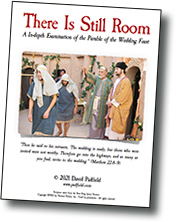The Parable Of The Wedding Feast

In the New Testament, Jesus gave a parable about the kingdom of heaven and compared it to a great wedding banquet given by a king for his son (Matt 22:1–14). It is evident, even to the casual reader, that the "king" in this passage is God Himself, and His "son" is Christ Jesus our Lord. Nearly every Christian has heard this parable expounded on and marveled at those who would reject a direct invitation from the King of Kings. They might have even pondered those who accepted the invitation but showed up unprepared to be a guest of royalty.
The parable of the wedding banquet must be considered in the light of the rejection of Jesus as the Messiah by the religious establishment of His day. Matthew places this parable after the triumphant entry of Jesus into the city of Jerusalem (Matt 21:1–11), which had happened on the Sunday before our Lord's death.
In our Lord's parable of the wedding banquet, the king extended a kind and gracious invitation in offering people an opportunity to share in the joy of his son. The ungrateful people who had been invited twice dishonored both the king and his son. The furious king dispatched those thankless people and invited others to a great banquet so his son would be honored. However, all those invited were expected to give the honor that was due to the king and his son. In application, the nation of Israel had been invited to a royal banquet with God, but instead, they rejected His prophets and finally killed His Son. God destroyed Herod's temple, leveled the city of Jerusalem, and then the call of the gospel went out "into all the world" (Mark 16:15).
Download This Free Book Now
There Is Still Room is a free book that examines the social and historical context of the parable of the wedding feast. You will need Acrobat Reader, free from Adobe Systems, to view and print this book (15 pages; PDF file size: 513k). All of the books on this website may be reprinted by individuals, churches, schools, and seminaries for their teaching programs. However, these books may not be altered in any way, and they must be given away at no charge.
